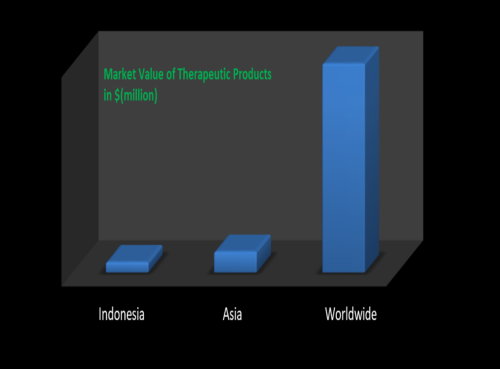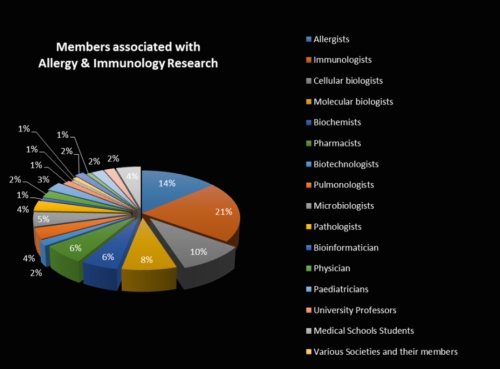Theme: Cracking the code on Allergies & Immune Disorders
Allergy 2019
ME Conferences organizes 300+ Conferences, 500+workshops and 200+symposiums on Clinical, Medicine, Pharma and Science & Technology. Immunology events are every year across UK, Europe, Asia, Middle East, Australia and USA that support immunology conferences from 1000 more scientific societies and Publishes 100+ open access journals which contain over 30000 eminent personalities, reputed scientists as editorial board members. Allergy 2019 comes under Immunology medical conferences.
With the coordination of the Organizing Committee, we are gratified to framework the program for the 14th International Conference on Allergy and Clinical Immunology, November, 2019 in Bali, Indonesia. Our conference includes a well-proportioned cast of speakers, covering both generous and precise topics. Our conference intents to provide allergists, immunologists, cellular and molecular biologists, biochemists, biotechnologists, microbiologists, pediatricians, physicians, specialists, doctors, technologist, professors, students and anyone professionally involved in Allergy and Immunology Care with an opportunity to learn about the multiplicity of the Immune system, discuss interventional procedures and reactions, look at sophisticated therapies and their efficacy and efficiency in the treatment of various immune disorders, and comprehend practical constraints in improving healthcare. The Allergy 2019 will be organized encompassing the theme “Cracking the code on Allergies & Immune Disorders". Allergy 2019 is comprehended of 18 tracks designed to offer widespread sessions that directs current issues in Allergy & Immunological research affairs.
Millions of individuals across the globe are affected by allergy and immune disorders – some are minor and others are critical. As per World Health Organization (W.H.O) research, more than 17.5 million people have asthma, an estimated 31% of all deaths worldwide and 80% of all asthma deaths are due to hypersensitivity. According to the market study, the global market for Immune disorders is expected to grow from $13.7 billion to $18.2 billion by 2019. An extreme part of research is going on Allergy and Immunology in the top Universities across the globe. Many companies are associated with various diagnostic instruments and other therapeutics. Besides these various universities and companies, societies and research labs are also associated in this research field.
This is a distinctive international meeting where allergists, immunologists, biotechnologists, pulmonologists, microbiologists, pathologists, bio-informaticians, physician, pediatrics and immunology professionals can meet their colleagues from around the world and exchange ideas and new information in the field of Allergy and Clinical Immunology.
The Program is designed for people who are actively involved in the field of Allergy and Immunology. We have gathered a renowned international faculty and attendees will gain the opportunity to learn and receive innovations about the latest knowledge in allergy care and immunology research.
Allergy 2019 invites all interested participants to consolidate us for this honored event at the gorgeous destination Bali, Indonesia. For more information: ME Conferences
Why to attend?
14th International Conference on Allergy and Clinical Immunology is among the World's leading Scientific Conference. The two-day event on Clinical Immunology and allergy practices will host 60+ Scientific and technical sessions and sub-sessions on innovative researches in the field of Allergy and Clinical Immunology across the globe. Allergy 2019 will constitutes of 15 major sessions designed to offer comprehensive sessions that states current issues in the various field of Allergy and Clinical Immunology.
The attendees can find exclusive sessions and panel discussions on latest innovations in Advanced Allergy treatments and Immune disorder therapeutics by:
- Lectures from renowned speakers
- Keynote forums by Prominent Professors, Doctors
- Open Innovation Challenges
- Poster presentations by Young Researchers
- Global Networking sessions with 50+ Countries
- Novel techniques to benefit your research
- Best platform for Global business and Networking opportunities
- Meet the editors of referred journals, Society and Association members across the Globe
- Excellent platform to showcase the latest products and formulations in Allergy & Clinical Immunology field
Target Audience:
- Allergists
- Immunologists
- Cellular and Molecular biologists
- Biotechnologists
- Pulmonologists
- Microbiologists
- Pathologists
- Bioinformatician
- Physicians
- Paediatricians
- Immunology professionals
- Allergy specialists
- Infectious diseases treatment doctors
- University Professors
- Various Societies and their members
- Institutes-Medical Schools Students
- Research Scholars
- Laboratory technicians
- Business Entrepreneurs
- Manufacturing Medical Devices Companies
- Companies producing vaccines, GMO’s and allergy therapeutics
Track 1: Clinical Immunology and Allergy
Clinical immunology deals with the study of diseases caused due to the disorders in the immune system. The disorders may be failure or aberrant action of immune system and sometimes due to malignant growth of cellular and molecular components of immune system. Hence cellular biology, molecular biology fields of science come into picture. Immunology deals with the study of several components of immune system, the immune reactions and mechanisms. Clinical immunology and allergy is a specialty of renewed interest and untapped potential. It covers several fields like pathology, biochemistry, biotechnology, genetics, pharmaceuticals, medicine etc. The study of these fields give hope to research and taps career for immunologists, cell biologists, molecular biologists, biochemists, bioinformaticians, allergists, physicians, microbiologists, pediatricians and so on. Allergy is the condition of adverse reaction of immune system towards any foreign substance. Allergy is of different types depending on the allergen (causative agent) and the diagnosis and treatment for each type varies.
Track 2: Infection and Immunity
The invasion of foreign organism on a host body for its growth and multiplication is termed as infection. The infection can lead to infectious diseases/ transmissible disease/ communicable disease. The infection can be caused by any infectious agents and their toxins causing several immune reactions like allergy, inflammation etc. Immune or allergic reactions arise upon infection due to the role of Host immune system to maintain immunity in the body. The infectious agents may be bacteria, virus, fungus, parasites, protozoans etc. As the agents vary, so does the route of transmission to enter into the host body and also the diseases, diagnosis and treatments. The immunity of an individual must be well enough to combat such infections. Immunity will be innately present in an individual from the mother through placenta and also later on through breast milk. Immunity will also be acquired by an individual during his/her lifetime through exposure to several allergens, microorganisms and foreign substances.
Track 3: Immunology and Immune System
The branch of biology and medicine which deals with the study of immune system in different organisms is immunology. The study covers the several components of immune system, their production, synthesis, function, pathway mechanism etc. The immune system comprises of several components like lymphoid cells and organs, Hematopoiesis, Immune receptors and co-receptors, Major histocompatibility complex (MHC’s), Antibodies and Cytokines, Transcription factors, Cell adhesion molecules (CAM’s) etc. These components play a vital role individually and in a group in an organism’s life against several infections and pathogens. Immunology field of study is an aggregation of several other fields like biology, cellular biology, biochemistry, nanotechnology, molecular biology, biotechnology, bioinformatics, computer science, sensor technology, pathology etc. The field has widened and progressed in several aspects which can be further discussed under the track.
Track 4: Molecular and Cellular mechanisms of Allergic Diseases
Each immune component has its own mechanism pathways for production and function. Molecular and cellular factors involved in these mechanisms must also be studied to get an insight on the immune system and discover solutions for any immune disorders. Molecular and cellular mechanisms which mediate allergic inflammation involve several multiple mediators, cell type and lymphocytes/ interleukins pathways. Allergy or allergic diseases is caused due to hypersensitivity of immune system in response to the genetics or environmental factors. The symptoms range from Rhinitis, inflammation, Allergic urticaria, Atopic eczema, Conjunctivitis, Angioedema and Anaphylaxis. The cure for several involves therapies, vaccines, Antihistamines, Decongestants, Moisturizing creams (emollients) and Steroid medication.
Track 5: Allergy and Inflammation
Allergy is one of the most adverse immune reaction faced worldwide by people which is next accompanied by inflammation. The set of conditions caused by Hypersensitivity of the immune system in response to any foreign substance is allergy/ allergic diseases. It may arise due to genetic or environmental factors. The causative agents are termed as allergen and they may be food, drug, dust, pollen, animal dander &fur etc. varying for each individual. Mostly allergen immunotherapy is the advanced therapeutics method to treat the allergies. Allergic and Inflammatory Reactions are caused by the immune system but if the reaction becomes adverse then the condition becomes chronic for an individual. The causative agents for such adverse reactions could be genetic, environmental, pathogenic and synthetic compounds. The localized body part which gets red, swollen, hot and painful after an injury or infection is an condition termed as inflammation and it might be due to allergy: Allergic inflammation or due to tumor. Inflammation can be acute or chronic and it consists of different types based on the part of inflammation.
Track 6: Food Allergies and Infections
Immunity of every individual varies hence the immune reaction by a person to specific food or medication will be different in concern with another individual. Food allergy is immune reaction developed by the body in response to specific food and food component. Few Individuals show allergy after consumption of foods like peanuts, fruit, shellfish, eggs, soy or cow's milk due to certain compound in these foods triggering the immune reaction. Several cases of food allergy are seen epigenetically and cause is still unknown. Symptoms include skin rashes, swelling and itching inside the mouth.
Track 7: Asthma and COPD
The condition of swollen, inflamed and extra mucosal lung airways upon infections or exposure to allergen is asthma/ bronchial asthma and the epigenetics of asthma varies accordingly. Asthma is long term chronic inflammatory disease of the lung airways caused by any specific allergen (Allergic asthma) or any other genetic / environmental factor (Non-Allergic Asthma) involving symptoms like wheezing, coughing, breath shortness and chest tightness. Research is going in a rapid pace due to increase in the asthma attack cases, mostly in children (Pediatric Asthma). Asthma allergy immunotherapy and several advances in treatment can be discussed in allergy conference like this.
Chronic obstructive pulmonary disease or COPD is a set of chronic inflammatory lung disease. The disease is contributed by Emphysema and chronic bronchitis. Emphysema is the condition in which the alveoli get destroyed and chronic bronchitis is the condition where inflammation of the lining of the bronchial tubes takes place. People who smoke even after having asthma or people who have long term exposure to chemical fumes, vapors and dusts in the workplace, fumes from burning fuel for cooking and heating in poorly ventilated homes are at risk of developing COPD. Rare cause for COPD is genetic disorder: alpha-1-antitrypsin deficiency. COPD symptoms don’t appear initially hence research in COPD diagnosis in enhancing as misdiagnosis can increase the risk of COPD in the person cause heart disease, lung cancer and so on.
Track 8: Veterinary Allergology
An allergic reaction to proteins found in an animal's skin cells, saliva or urine is veterinary allergy or Allergology. The pet hair, fur or proteins present in a pet's dander, skin flakes, saliva and urine can induce allergic reaction or cause asthma symptoms in some people. There are several case studies on pet allergies. Pet allergy is mostly seen towards cats and dogs as they are the most common pets worldwide. Cat allergy immunotherapy is widely used by cat lovers. Some cases have been seen where allergy reactions are seen to venom, bite and sting of insects and also to proteins found in animal products where the food allergy comes into picture too.
Track 9: Neonatal and Pediatric Immunology
Considering the case of neonates and children where the immune system is not fully functional at birth and still developing later on, the chances of them being susceptible to infections and pathogens is high and response to vaccines is not that effective compared to adults. This could later lead to development of allergy, asthma or other immune disorders hence the care and prevention methods employed is discussed under Neonatal Immunology and Pediatric immunology. Infants receive their innate immunology through their mother either by placenta when they are in the womb or through breast milk. Asthma pregnancy i.e. if the mother has asthma then chances exists for children to develop allergy/ asthma. Children who get in contact with several foreign agents are prone to Pediatric Allergy.
Track 10: Immune Disorders
Disorders caused by the deficiency, failure or aberrant action of immune system or the malignant tumor growth in the immune system are immune disorders. They are several type’s namely immunodeficiency disorders (primary and secondary), Allergies and Autoimmune diseases. Allergy and inflammatory diseases are immune disorders caused by over reaction of the immune system. The diagnosis, prevention and treatment methods for all varies widening the research in medicine and immunology fields. So far the causes and treatment of several of these disorders is not discovered.
Track 11: Diagnostic Immunology
Diagnostic immunology or immunodiagnostics are diagnosis methods and techniques employed for the detection of allergy, asthma and immune disorders like AIDS, Rheumatoid arthritis, Multiple sclerosis, Type 1 diabetes mellitus etc. Allergy diagnosis is segmented into assay kits, instruments and services. Immunoassays, Immunofluorescence, Immunofixation and Immunoadsorption are some of the assays. Instruments involve cytometer, immunoassay analyzers, luminometers, ELISA analyzers, MHC multimer and other instruments. Histology and Immunology tests, molecular methods and immune system assessment are also several other diagnostic techniques.
Track 12: Prevention and therapy
Best way to prevent an allergy is allergen avoidance. Several food allergens like peanuts, seafood, milk, egg, and soybean can be avoided. Drug allergens, dust and pet animals can also be avoided to be allergic free. Other prevention methods involve exclusive breast feeding for 1st 4 months of life, inclusion of Vitamin C, Vitamin E, Omega-3 polyunsaturated oils and good probiotic bacteria in diet, use of Leukotriene receptor antagonists, steroid sprays, Decongestants etc. Vaccination, Immunotherapy and transplantation are now the widely used approaches towards allergy and immune disorders therapy. Gene therapy is the advanced therapeutic approach to fight allergy and immune disorders.
Track 13: Vaccines and Immunization
Often vaccination and immunization are used interchangeably but their meaning isn’t the same. The act of introducing vaccine to a body is termed as Vaccination. Immunization is the process through which the person/ animal gets protected against any disease. Vaccines are antigenic substances or biological preparations used to provide immunity against infectious diseases. Vaccines are several for different types of diseases like Mumps, Hepatitis, Diphtheria, Cholera etc
Track 14: Immunotherapy and Transplantation
Immunotherapy is one of the preventive treatment method employed against allergy and other immune disorders like asthma, rhinitis, cancer etc. Immunotherapy used to treat cancer is cancer immunotherapy, to treat allergy is allergy immunotherapy, to treat allergic asthma is Asthma allergy immunotherapy, to treat food allergy is food allergy immunotherapy, to treat peanut allergy is peanut allergy immunotherapy. It can be activated, suppressed, helminthic, subcutaneous, sublingual and adjuvant immunotherapy.
The engraftment or transfer of cells, tissues or organs for the revival of body functions is transplantation and the process involves several types like Allograft, Xenograft etc. Several ethics and regulations are concerned with the process and as the number of allergy cases has increased after the transplant (Transplant-acquired allergy: TAA) the process is debated and researched for better solutions and reduced/nil allergic and immune reactions. Autologous hematopoietic stem cell transplantation (HSCT) has been used for treatment of severe immune diseases. Transplant surgery success rate is not a huge number with transplant complications and posttranplantation care but it still counts as an effort for the treatment of allergy and immune disorders.
Track 15: Market and Future of Therapeutics
Allergy diagnostics and immunotherapeutic market is expected to increase by a huge amount suspects several market analysts due to increasing prevalence of allergic conditions. The increasing lifestyle habits, pollution and urbanization targets diseases like asthma and food allergy at a hype increasing the incidences of allergies and demanding cost effective , sensitive and accurate diagnostic products and therapeutics among hospitals, diagnostic labs and healthcare companies worldwide. The rising level of environmental pollution and the need for faster, accurate and high throughput technologies has increased the allergy diagnostics market product wise with assay kits, immunoassay analyzers, luminometers and ELISA analyzers dominating the market which is followed by inhaled allergens. North America followed by Europe, Asia and Middle East are countries accounting for allergy research and market share.
14th International Conference on Allergy and Clinical Immunology welcomes presenters, exhibitors and attendees from all over the globe to Bali, Indonesia during November 21-22 2019. The organizing committee is preparing for an appealing and informative conference program including lectures, workshops, symposia on a wide category of topics, poster presentations, young researcher forums and various programs for participants from across the globe. We graciously invite you to unite with us at the International Conference on Allergy and Clinical Immunology, where you will have an intelligible experience with scholars from overseas. Organizing committee and all attendees of Allergy 2019 look forward to meet you at Bali, Indonesia.
Conference Highlights:
- Clinical Immunology and Allergy
- Infection and Immunity
- Immunology and Immune System
- Molecular and Cellular mechanisms of Allergic Diseases
- Allergy and Inflammation
- Food Allergies and Infections
- Asthma and COPD
- Veterinary Allergology
- Neonatal and Pediatric Immunology
- Immune Disorders
- Diagnostic Immunology
- Prevention and Therapy
- Vaccines and Immunization
- Immunotherapy and Transplantation
- Market and Future of Therapeutics
Scope and importance:
Immunology is a branch of medicine dealing with disorders of the immune system. It includes medical diagnosis and treatment of allergy, autoimmune diseases, AIDS, inflammatory diseases etc. Immunologists study the abnormal functions of the immune system, but the study of adult and child immunology differs. Therefore, an adult immunologist (often qualified and called just “immunologist") is not fully trained to take care of children, and pediatric immunologists are inadequately trained for adults. The branch of immunology divides itself into clinical immunology, fetal/neonatal immunology, pediatric and many others based on the individual category, immune system and applications.
Why Bali:
Prevalence of immune disorders namely allergies are increasing worldwide however compared to developed countries like USA, Australia and Europe, Indonesia has a lower rate of allergy reports. Recently though studies have found that there have been slight increase in asthma and food allergy cases among children and few adults in Indonesia. Bali being one of the top 10 tourist destinations has travelers and tourists facing food allergy and asthma cases more than locals.
Why to attend???
Throughout the globe the research and market on Allergy and Immunology is trending with large number of researchers, scientists and doctors from several hospitals, universities, labs and communities engaging in the field. It will be a great opportunity for individuals from this respective field to participate in this Allergy and Clinical Immunology Conference which will conduct demonstrations, distribute information, allow networking with current and potential researchers and give name recognition. The 2 days event will highlight world-renowned speakers, the most recent techniques, tactics, and the newest updates in Immunology field.
The weather, food and lifestyle habits in Indonesia increases the evidence of allergies and immune disorders mainly allergic rhinitis, allergic asthma, Allergic conjunctivitis and food allergy among children in huge number and in adults to a lesser extent. This leads to increase in market share of allergen products and immunotherapy devices in Indonesia. The graph shows the market growth of therapeutic solutions and products for allergy and immune disorders

The increase in allergy and immune disorders has widened the immunology research in different segments and brought forward several companies, institutes, hospitals and doctors from different fields of biology like pediatrics, cellular biology, pathology etc. The role and contribution of different members can be seen in the following graph

Related conferences:
- 15th International Conference on Infectious Diseases, Prevention and Control, April 27-28- 2020, Helsinki
- 11th World Congress and Expo on Clinical and Experimental Dermatology, August 02-03, 2019 Chicago, USA
- 34th World Congress on Vaccines and Immunization, August 12-13-2019 Auckland, New Zealand
- 13th International Conference on Allergy, Asthma & Clinical Immunology, August 29-30, 2019 Vienna, Austria
- 2nd Global Congress on Asthma, Allergy and Immunology, September 18-19-2019 Tokyo, Japan
- 15th World Conference on Cosmetic Dermatology & Skin Diseases, September 25-26, 2019, Lisbon, Portugal, USA
- 9th International Conference on Chronic Obstructive Pulmonary Disease, October 24-25-2019 , Helsinki
- 9th Global Experts Conference on HIV, STDs and Co-Infections, November 06-07- 2019 , Yokohama, Japan
- Neuro immunology and Neuro inflammation Conference: From Discovery to Health, November 11-12- 2019, Istanbul
- Global Congress on Cancer Immunology and Epigenetics ,November 13-14-2019, San Francisco, CA, United states of America
- 7th Annual Conference on Parasitology & Infectious Diseases, November 18-19 -2019, Johannesburg
- World Conference on Vaccine and Immunology, November 21-22, 2019, Dubai
List of societies:
- Alabama Society of Allergy, Asthma, and Immunology
- Algerian Society of Allergy and Clinical Immunology
- American Association of Immunologists
- American Academy of Allergy, Asthma, and Immunology
- Argentine Association of Allergy and Immunology
- Asthma Society of Ireland
- Asthma Association Bangladesh
- Australasian Society of Clinical Immunology and Allergy
- Austrian Society for Allergology and Immunology
- Bangladesh Society of Allergy and Immunology
- Belgian Society for Allergy and Clinical Immunology
- British Society of Allergy and Clinical Immunology
- British Thoracic Society
- Brazilian Association of Allergy and Immunology
- Bulgarian Society for Immunology
- Canadian Society of Allergy and Clinical Immunology
- Canada Asthma Society
- Chinese Society of Allergology
- Czech Society of Allergology and Clinical Immunology
- Croatian Society for Allergology and Clinical Immunology
- Dutch Society of Allergology
- Danish Asthma and Allergy Association
- Egyptian Society of Allergy and Clinical Immunology
- European Federation of Immunological Societies
- European Academy of Allergy and Clinical Immunology
- European Respiratory Society
- Estonian Society for Immunology and Allergology
- Federation of African Immunological Societies
- Federation of Clinical Immunology Societies
- Finnish Society of Allergology and Clinical Immunology
- French Society of Allergy and Clinical Immunology
- German Society for Allergology and Clinical Immunology
- Georgian Association of Allergology and Clinical Immunology
- Hellenic Society of Immunology
- Hong Kong Allergy Association
- Hong Kong Asthma Society
- Hungarian Society for Immunology
- Iranian Society for Immunology and Allergy
- Iranian Society of Asthma and Allergy
- Irish Society for Immunology
- Israel Association of Allergy and Clinical Immunology
- Indonesian Society of Allergy and Immunology
- Indian Academy of Allergy
- Italian Society of Allergology and Clinical Immunology
- Japanese Society for Immunology
- Japanese Society of Allergology
- Kenya Allergy Society
- Kosovo Allergy Asthma and Immunology Association
- Korean Association of Immunologists
- Korean Academy of Asthma, Allergy and Clinical Immunology
- Lebanese Society of Allergy and Immunology
- Lithuanian Society for Immunology
- Malaysian Society of Allergy and Immunology
- Nigerian Society for Immunology
- Norwegian Asthma and Allergy Association
- Philippine Society of Allergy, Asthma and Immunology
- Portuguese Society of Allergology and Clinical Immunology
- Polish Society of Allergology
- Romanian Society for Immunology
- Russian Association of Allergology and Clinical Immunology
- Scandinavian Society for Immunology
- Saudi Allergy Asthma & Immunology Society
- South Africa Allergy Society
- Spanish Society of Allergology and Clinical Immunology
- Swiss Society for Allergology and Immunology
- Swedish Association for Allergology
- Tanzania Immunology Society
- Turkish National Society of Allergy and Clinical Immunology
- Tunisian Society of Immunology
- Allergy, Asthma and Immunology Society of Thailand
- Ukrainian Society of Allergy and Clinical Immunology
- Vietnam Association of Allergy, Asthma and Clinical Immunology
- Zimbabwe Society of Immunology
Hospitals Associated with Allergy and Immunology Research:
Indonesia Hospitals:
- RS Columbia Asia Semarang
- Columbia Asia Hospital Pulomas
- Siloam International Hospitals – Manado
- BIMC Hospital Nusa Dua
- Bali Royal Hospital
- Mahkota Medical Center
- Prima Medika Hospital
- Columbia Asia Hospital Medan
- Mahkota Melaka Hospital
- Siloam Hospital
- OMNI Hospitals Pulomas
- BIMC Hospital Kuta
- Inco Hospital
- Indonesia Hospital
- Siloam Hospitals Lippo Village
- Kasih Ibu General Hospital Denpasar
- Siloam Hospitals Kebon Jeruk
- Rumah Sakit Siloam
- Siloam Hospitals Balikpapan
Bali Hospitals:
- Siloam Hospitals Kuta
- BIMC Hospital Kuta
- BIMC Hospital Nusa Dua
- Sanglah General Hospital
- Kasih Ibu General Hospital Denpasar
- Prima Medika Hospital
- Surya Husadha Hospital
- Balimed Hospital
- Bali Royal Hospital
- Siloam Medika Canggu
- Surya Husadha General Hospital
- Kasih Ibu General Hospital Saba
- Kasih Ibu General Hospital Kedonganan
- Graha Asih Hospital
- RS BaliMed Karangasem
- Amlapura Public Hospital
- Kasih Ibu General Hospital Tabanan
Worldwide Hospitals:
- University Hospital Austral
- RP Medical Center
- British Hospital
- Italian Hospital
- Hospital Alemán
- St Vincent's Hospital
- The Royal Children's Hospital
- Royal Prince Alfred Hospital-Immunology
- John Hunter Hospital Immunology & Infectious Diseases Unit
- Canberra Hospital
- John James Medical Centre
- Kuopio University Hospital
- Turku University Hospital
- CHP Saint-Grégoire
- American Hospital of Paris
- Angers University Hospital
- Hôpital de Hautepierre
- Hôtel-Dieu de Paris
- Grenoble University Hospital
- University Medical Center Freiburg
- Chania General Hospital
- Ioannina University Hospital
- Karditsa General Hospital
- Chanre Rheumatology & Immunology Center
- Apollo Gleneagles Hospitals
- Continental Hospitals
- Fortis Memorial Research Institute
- St Marys Hospital
- Salvator Mundi International Hospital
- US Navy Hospital
- Bambino Gesù Hospital
- Hospital of Santa Maria Nuova
- Niguarda Ca 'Granda Hospital
- Timberland Medical Centre
- Island Hospital
- Juarez Hospital in Mexico
- Hospital Velmar
- Galenia Hospital
- Hospital Angeles
- Salutaris Medical Center
- Academic Medical Centre
- Academic Hospital Maastricht
- Erasmus MC
- Radboudumc
- UMC Utrecht
- Amsterdam Rheumatology & Immunology Center
- Asan Medical Center
- Central Clinical Hospital, Katowice
- GMS Clinic Yamskaya
- American Medical Clinic
- Avcilar Hospital
Conference Highlights
- Clinical Immunology and Allergy
- Infection and Immunity
- Immunology and Immune System
- Molecular and Cellular mechanisms of Allergic Diseases
- Allergy and Inflammation
- Food Allergies and Infections
- Asthma and COPD
- Veterinary Allergology
- Neonatal and Pediatric Immunology
- Immune Disorders
- Diagnostic Immunology
- Prevention and Therapy
- Vaccines and Immunization
- Immunotherapy and Transplantation
- Market and Future of Therapeutics
To share your views and research, please click here to register for the Conference.
To Collaborate Scientific Professionals around the World
| Conference Date | November 21-22, 2019 | ||
| Sponsors & Exhibitors |
|
||
| Speaker Opportunity Closed | Day 1 | Day 2 | |
| Poster Opportunity Closed | Click Here to View | ||
Useful Links
Special Issues
All accepted abstracts will be published in respective Our International Journals.
- Journal of Clinical & Cellular Immunology
- Journal of Allergy & Therapy
- Journal of Immunological Techniques & Infectious Diseases
Abstracts will be provided with Digital Object Identifier by




